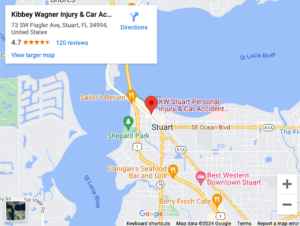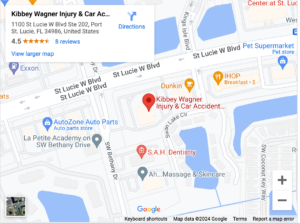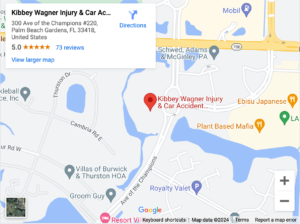
You can receive compensation for a variety of damages in a personal injury case, including punitive damages. These damages “punish” the egregious conduct of the defendant. However, punitive damages are only awarded in a small number of personal injury cases.
What Are Punitive Damages in a Stuart Personal Injury Case?

Most of the damages for a personal injury claim are compensatory. The settlement or jury award compensates the victim for losses incurred because of the accident and injury.
For example, economic damages compensate the victim for out-of-pocket expenses, medical bills, therapy costs, and lost wages. Non-economic damages compensate the victim for their physical pain and suffering, decreased quality of life, emotional distress, and permanent impairment.
However, punitive damages are non-compensatory. They do not compensate the injured party for losses or expenses. Instead, punitive damages serve as punishment for a person’s conduct.
Punitive damages can be awarded in all types of personal injury cases, including but not limited to:
- Motor vehicles, especially those involving drunk driving, excessive speeds, and road rage
- Product liability claims (i.e., intentionally hiding a defect that could cause harm or death)
- Medical malpractice, including operating while intoxicated or concealing mistakes
- Nursing home abuse and neglect
- Workplace accidents
- Boating accidents, including boating under the influence
Case law and statutes govern an award of punitive damages in Florida. An injured party files a personal injury lawsuit seeking punitive damages. Insurance companies do not usually include punitive damages in settlement amounts.
When Are Punitive Damages Awarded in Stuart?
Florida Torts Statute §768.72 states that punitive damages can be awarded when there is clear and convincing evidence that the defendant’s conduct amounted to gross negligence or intentional conduct. The statute defines conduct for punitive damages as:
- Gross Negligence – The defendant acted in a manner that was so reckless or lacking care that the conduct constituted a conscious indifference or disregard for the rights, safety, and lives of other people.
- Intentional Misconduct – The defendant knew the conduct was wrong and had a high probability of causing damage or injury. However, the defendant intentionally proceeded with the conduct despite that knowledge.
The jury members decide if the defendant’s conduct rose to a level to justify punitive damages. However, the burden of proving punitive damages is higher than the burden of proof required for negligence and other civil actions.
The injured party must prove by “clear and convincing” evidence that the allegations against the defendant are true. This level of proof is higher than by a preponderance of the evidence used to prove the rest of the case. “Clear and convincing” means the evidence is “highly and substantially” more likely to be true.
Does Florida Cap Punitive Damages for Personal Injury Claims?
Caps limit the amount of money you can receive for a personal injury case.
Some states place caps on economic and non-economic damages. Florida does not. You can receive full compensation for all losses and expenses after an accident.
However, Florida does place a cap on the amount of punitive damages a person can receive for a personal injury lawsuit. An injured party can receive three times the amount of their compensatory damages or $500,000.
There are some exceptions to the caps for punitive damages in Florida. Those exceptions include:
- $2 million cap if the conduct was motivated only for unreasonable financial gain
- No cap when the defendant had the specific intent to harm the injured party
- The caps might not apply if the cases involve abuse of an older adult, child, or person with developmental impairments
- Being intoxicated at the time of committing the act removes the caps on punitive damages
Our legal team analyzes every case to determine if the facts of the case could support an award for punitive damages. If so, we discuss our client’s likelihood of winning the case at trial. We also discuss the benefits and disadvantages of taking a personal injury case to court.
What Is the Deadline for Filing a Punitive Damages Claim?
A punitive damages claim is part of a personal injury lawsuit. A statute of limitation is the deadline for filing a lawsuit.
The Florida statute of limitations for most personal injury claims is two years. If you do not file a lawsuit before the deadline, you cannot pursue an action in court to recover money.
However, there are exceptions to the rule. Therefore, it is in your best interest to speak with a Stuart personal injury lawyer as soon as possible after an accident or other injury. An attorney calculates the deadlines for filing claims to protect your right to pursue legal action against the party who caused your injury.
Schedule a Free Consultation With Our Stuart Personal Injury Lawyers
You deserve maximum compensation for your injuries and damages. Our experienced Stuart personal injury attorneys pursue all available damages. Call (772) 444-7000 to contact our law firm for a free consultation to discuss your case with an injury lawyer at Kibbey Wagner Injury & Car Accident Lawyers.




